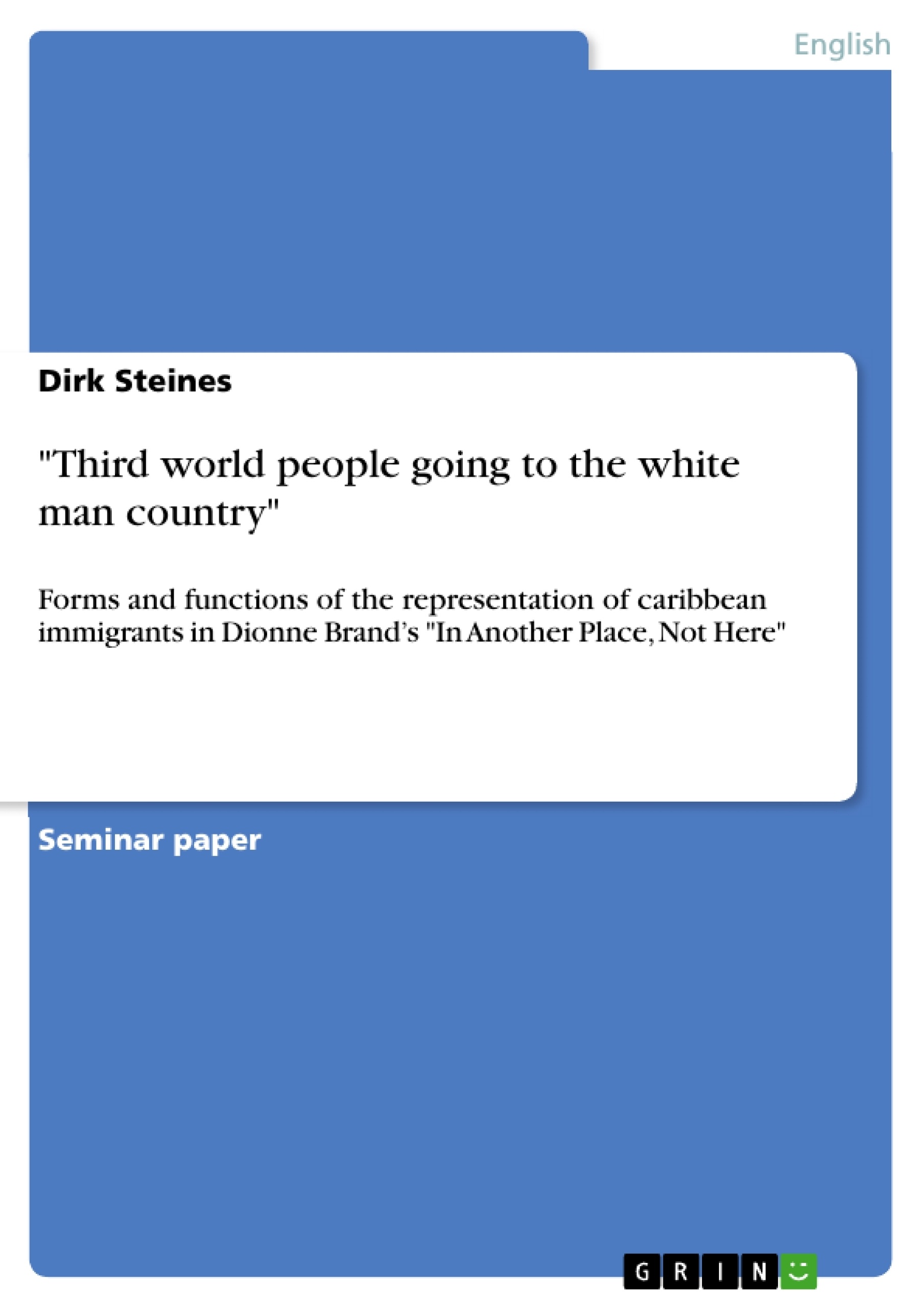Although multiculturalism became an official government policy iduring the 1970s, this was not mirrored on the literary scene in Canada instantly. It was not before the 1980s and 90s when an emerging group of female writers, who offered alternative accounts for the representation of different individual concepts of the self, came into the public focus. Finding answers to what constitutes Canadian identity becomes more and more difficult, when literary backgrounds and biographies shift from linear to more complex settings.
Being born in 1953 on the Caribbean island of Trinidad, Dionne Brand stands for the “New Voices of the 1990s” (Howell 205), especially for the emergence of authors coming from an African descent. Her experiences as a teacher and as social and political activist provide a rich soil for her narrative imagination as she “conveys her politics in her poetry, essays, and films, as well as through her community activism” (Johnson and Curtright). Being a lesbian black feminist, she revives some of her experiences of being marginalized in several ways and reconsiders them in In Another Place, Not Here in a love story of two black women, which is situated partially in Toronto and the Caribbean.
In this paper I will argue, that Brand takes on a position in her novel, which shows that the construction of an identity for (lesbian) Caribbean-Canadian women cannot be based on assimilation into the society of Canadian urban areas at its current appearance, since it oppresses marginal groups in various ways. The question of home or “here”, which is central in an individual’s identity, is constantly being negotiated, as the title of the novel already implies, within the individual characters of the novel. For this purpose I will examine the representation of Elizete and Verlia, the two protagonists of the novel, and Verlia’s aunt and uncle in Sudbury, who hosted her the first weeks after she had come to Canada. In doing so, I will refer to theoretical frameworks of the neo-slave narrative and the concepts of “Passing” and “The Black Atlantic” as they provide fruitful applications for interpreting the novel in this context.
Inhaltsverzeichnis (Table of Contents)
- Introduction
- Three Different Encounters with a Repressive Society
- Neo-Slavery Experiences by Elizete
- Passing for White Middle Class - Verlia's Aunt and Uncle
- The Search for Home - Liquid Imagery in the Description of Verlia and the Movement
- Conclusion
- Bibliography
Zielsetzung und Themenschwerpunkte (Objectives and Key Themes)
This paper examines the representation of Caribbean immigrants in Dionne Brand's novel "In Another Place, Not Here," focusing on how the construction of identity for (lesbian) Caribbean-Canadian women is challenged by the oppressive nature of Canadian society. The author analyzes the experiences of the protagonists Elizete and Verlia, exploring the themes of neo-slavery, passing, and the search for home within the context of the "Black Atlantic."
- The impact of neo-slavery on the lives of Caribbean immigrants in Canada
- The complexities of "passing" for a different racial or social group
- The search for a sense of belonging and home within a new cultural landscape
- The representation of lesbian identity within the context of Caribbean immigration
- The role of language and imagery in constructing identity and experience
Zusammenfassung der Kapitel (Chapter Summaries)
The introduction explores the concept of Canadian identity and its complexities, particularly for immigrant writers. It highlights the importance of "Where is here?" in understanding Canadian cultural nationalism. The author then introduces Dionne Brand and her novel, "In Another Place, Not Here," as a work that challenges traditional notions of identity and belonging.
The first chapter delves into the experience of Elizete, one of the novel's protagonists. Elizete's journey to Canada after a tragic encounter with Verlia in the Caribbean is analyzed through the lens of neo-slavery, highlighting the enduring impact of colonialism and its implications for immigrant experiences. The chapter explores the interplay of earthbound imagery, which connects Elizete's body to experiences of pain and violence, and the complexities of love and loss in her life.
Schlüsselwörter (Keywords)
This preview focuses on key terms such as Canadian identity, Caribbean immigration, neo-slavery, passing, the Black Atlantic, lesbian identity, and the construction of home. It highlights the challenges faced by marginalized groups in negotiating their place within a complex and often oppressive social landscape. The use of literary techniques like imagery and storytelling are also important aspects of the analysis.
Frequently Asked Questions
What is the main argument of the paper on Dionne Brand's novel?
The paper argues that identity for Caribbean-Canadian women cannot be based on mere assimilation, as Canadian society oppresses marginal groups in various ways.
Who are the protagonists in "In Another Place, Not Here"?
The novel focuses on two black women, Elizete and Verlia, and their experiences in both the Caribbean and Toronto.
What does the concept of "Passing" mean in this context?
"Passing" refers to the attempt of individuals to be accepted as members of a different social or racial group, illustrated by Verlia's aunt and uncle in Sudbury.
How is the theme of "Neo-Slavery" used in the analysis?
The author uses neo-slavery to describe Elizete’s experiences, highlighting the enduring impact of colonial structures on modern immigrant lives.
What role does lesbian identity play in the novel?
Dionne Brand explores the intersection of race, gender, and sexuality, showing how being a lesbian black immigrant creates unique layers of marginalization.
- Citar trabajo
- Diplom Sportwissenschaftler Dirk Steines (Autor), 2007, "Third world people going to the white man country", Múnich, GRIN Verlag, https://www.grin.com/document/74498



